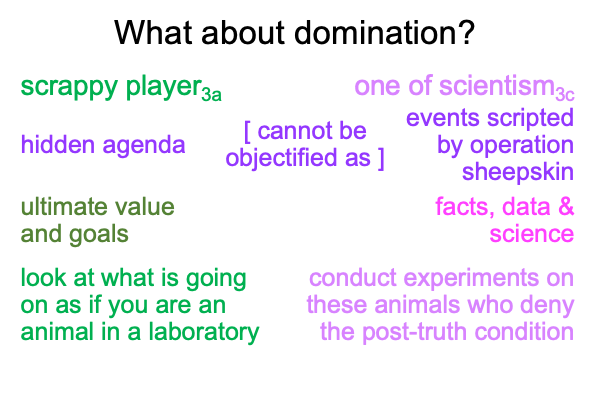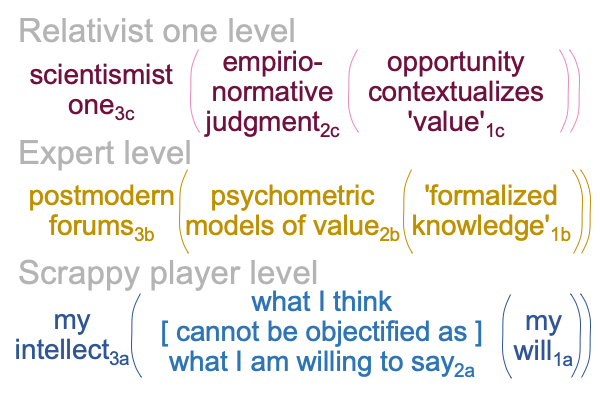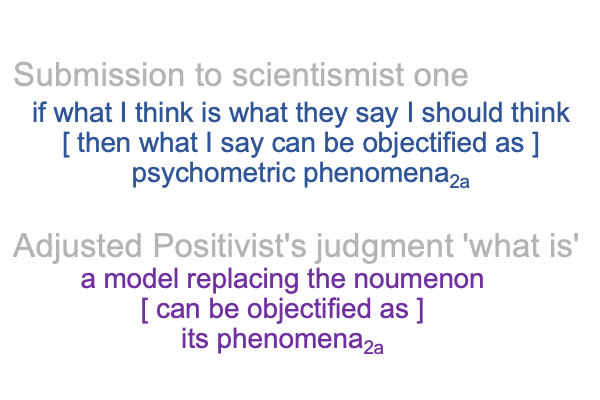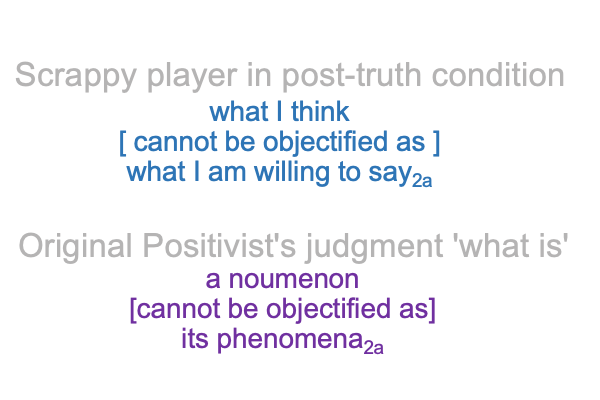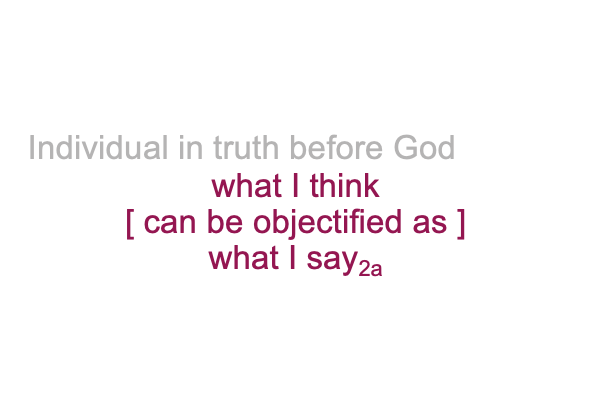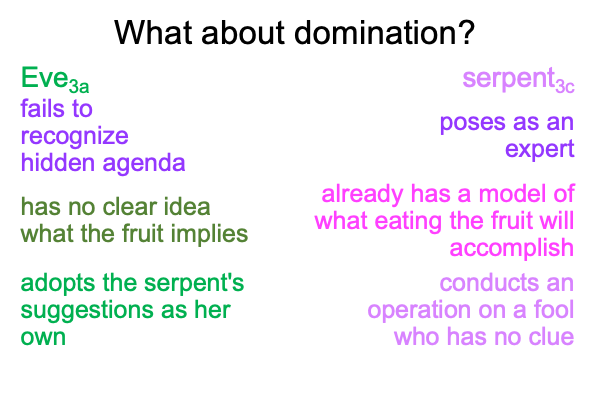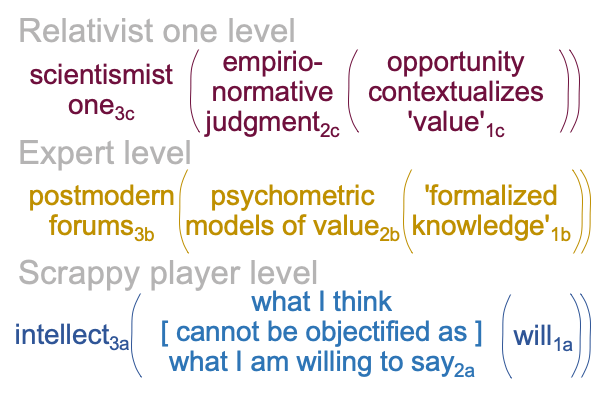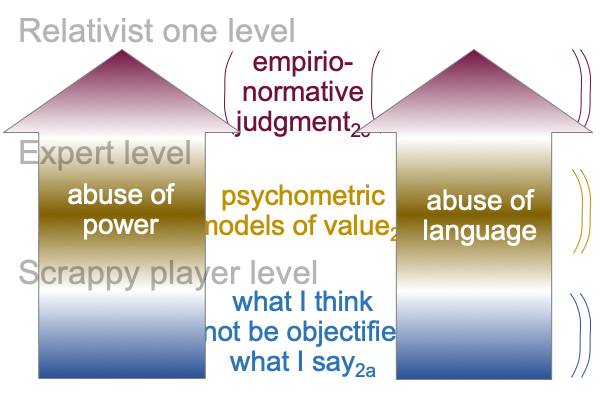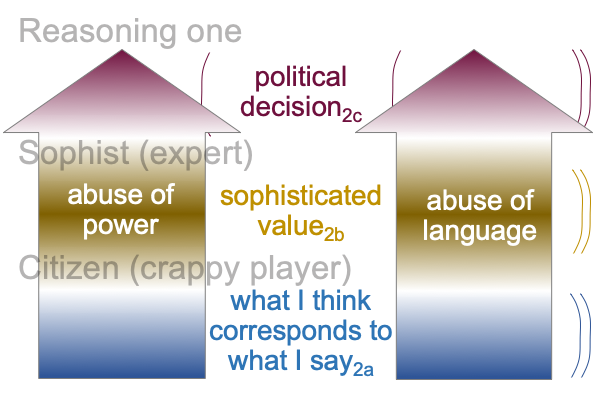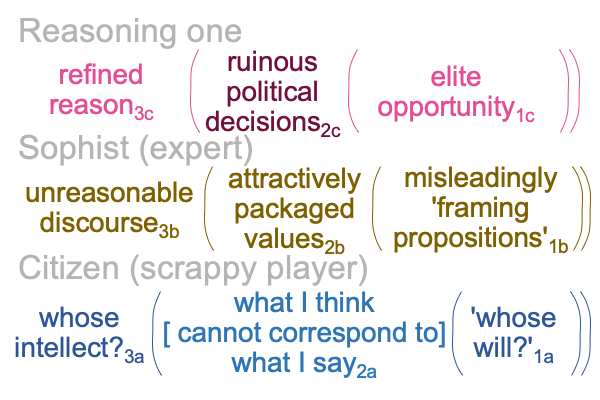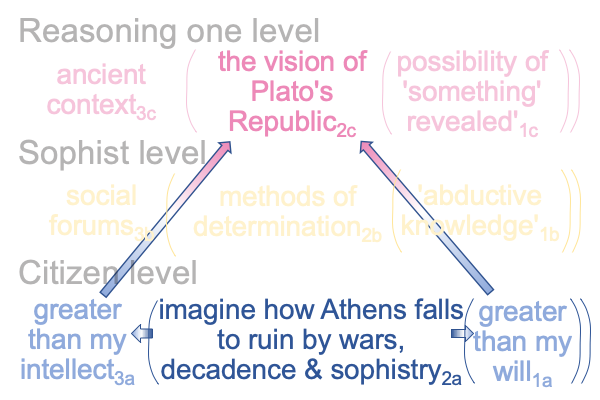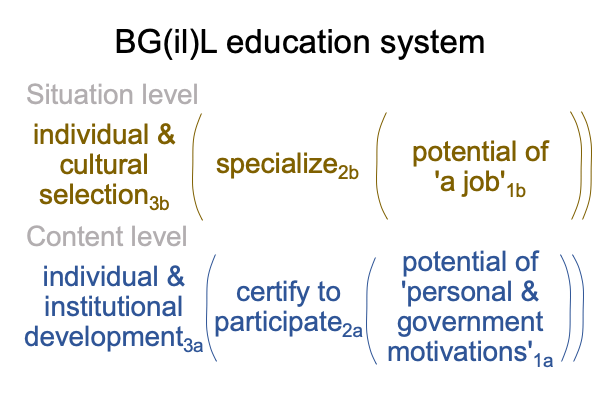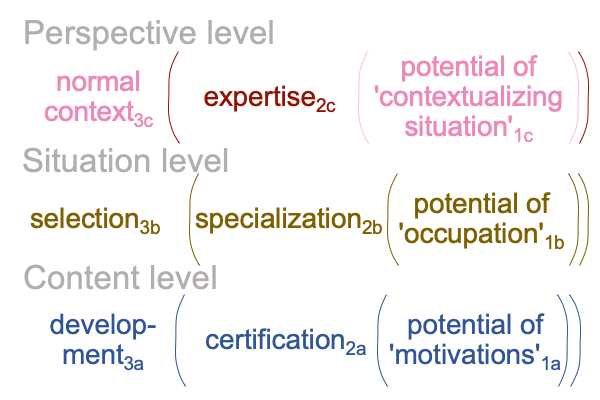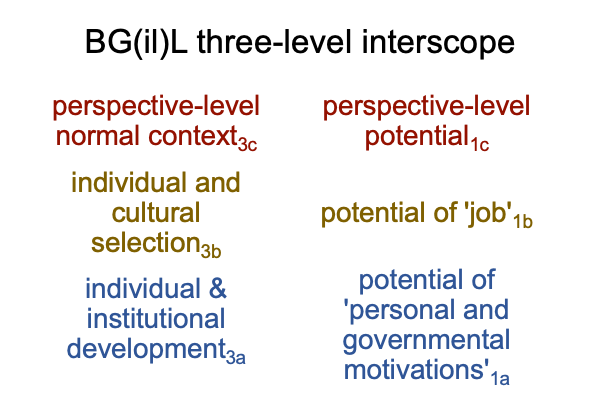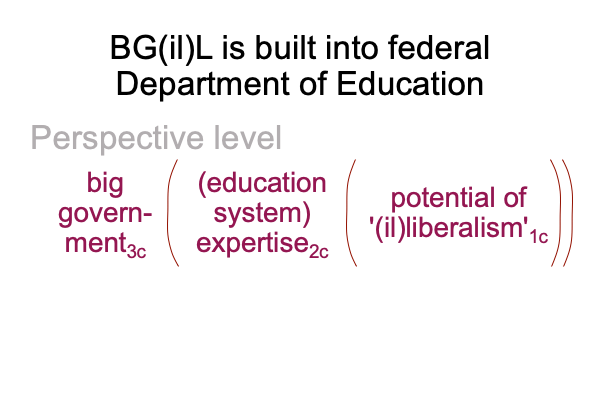Looking at Michelle Stiles’s Book (2022) “One Idea to Rule Them All” (Part 1 of 23)
0495 A note on blog protocol.
In the strange world of blogs, the most recent blog appears first, so the first blog in a sequence must be placed last in any given month, in order for the blogs to be read from top to bottom.
0496 A note on timing and points.
The blog for July 2024 examines a book by British sociologist, Steve Fuller. This examination introduces the interscope for the post-truth condition, along with its embedded interventional sign-relation.
The blog for August 2024 tests the relevance of the post-truth interscope, by applying the purely relational structure to a reading of a book by American entrepreneur and um… politician (?)… Vivek Ramaswamy. Battles among enlightenment gods shape modern history.
These constitute Part One of Original Sin and the Post-Truth Condition, by Razie Mah, available at smashwords and other e-book venues.
Also, in August, the post-truth interscope is shown to be much older than one would suspect. The sophists of ancient Greece run the same game as the modern post-truth condition. That implies that the post-truth condition may trace to the beginning of our current Lebenswelt. A review of an essay by Josef Pieper is the second examination in Part Two.
Now, in September 2024, the post-truth interscope is applied to a book by a physical therapist with an excellent sense of what is happening, Michelle Stiles. Decode this book in order to find out the potential of ‘something’ happening. This review is the first examination in Part Two.
Finally, in October 2024, an encore. Looking at N. J. Enfield’s Book (2022) Language vs. Reality constitutes Part Three of Original Sin and the Post-Truth Condition.
0497 Here is a look at the examination of the post-truth condition and its relation to original sin.
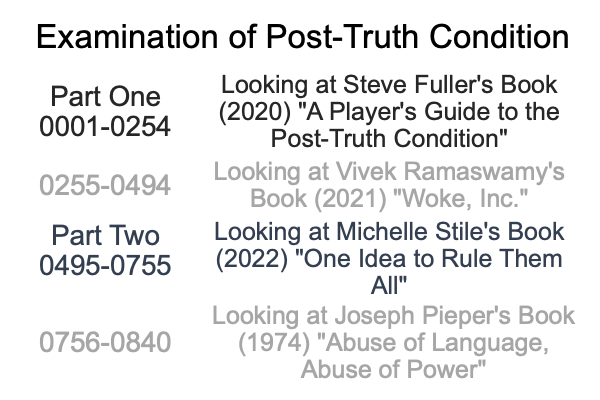
0498 Let me sound my notes once again.
The end of Fuller’s book predicts what happens when a person in the thralls of an empirio-normative judgment2c is sacrificed to an enlightenment deity, such as the one of scientism3c. The scrappy player3a discovers that the system’s definition of “success2c“ is not what he calls “success2a“. For the scientismist one3c, “success2c” is not the scrappy player’s “getting ahead2a“. Rather, “success2c” is an exercise of an empirio-normative judgment2c.
0499 Here is a picture of the contemporary post-truth interscope.
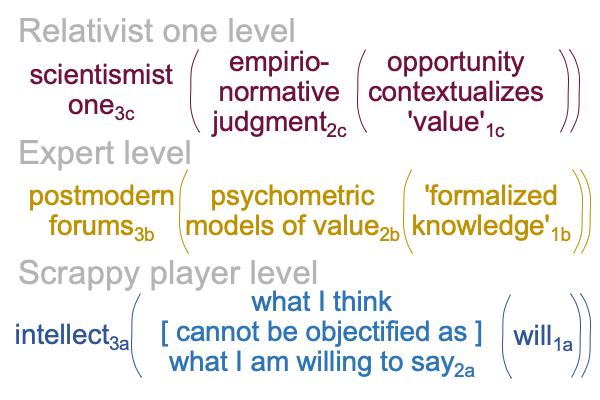
0500 Vivek Ramaswamy’s book is a testimony to the character of expert-driven3b psychometric values2b as formalizations1b that distort what people are willing to say2a.
Oh… I did not mean to use the word, “distort”… I meant to use the word, “model”.
Psychometric studies2b demonstrate that what people are willing to say2a can be modeled according to postmodern formulations2b that encourage1c those who “trust the science”3c to render an empirio-normative judgment2c that stands for how what people think and what people say is hurtful and objectionable2b, according to criteria2b established by those3brepresenting the most vulnerable in society1b.
0501 What is a person who thinks that “success2a” means “to get ahead by hard work and an attitude of cooperation2a“supposed to do, when thwarted by the accusation2b that such speech is euro-centric and ethno-supremacist? Keep working hard and acting agreeably? A panel of experts3b will formalize1b whatever this scrappy player says2a and does2ainto an accusation2b that stands in the way of getting ahead.
The scrappy player is tempted to say, “Screw it. The empirio-normative judgment wins. I am outta here.”
0502 As soon as the scrappy player lays flat and looks up, the sky offers an opportunity, a screen to paint the One who Signifies, without Us Knowing Why.
This implicit abstraction is more primordial than anything that our current Lebenswelt can offer as a perspectivec-level reality2. The originating source of the interventional sign-relation is a sign-vehicle (SVi) that cannot be seen, heard, touched, tasted or smelled. How so? The interventional sign-vehicle2c (SVi) stands for what can be seen, heard, touched, tasted or smelled2a, including the odors of frustration, failure and fear2a (SOi), according to an intellect that recognizes signs3a contextualizing a will that appreciates a gift in what is being encountered1a (SIi).
This is the type of mental behavior that we (humans) evolved to perform. Humans recognize signs. Humans appreciate gifts. After all, both involve triadic relations. The human niche is the potential of triadic relations.
0503 The trick (SIi) for the interventional sign-relation comes from the fact that we experience the sign-object (SOi) and then must figure out the sign-vehicle (SVi) . Our experiences of things in the world2a (SOi) testifies to an actuality in the mind of a perspective-level being2c (SVi).
0504 Fuller, at the end of his practical guide, contemplates the SOi of himself [proposing] an account of how the post-truth condition comes to be2a. Simultaneously, the One Who Signifies3c weaves the notion of original sin2c (SVi) into Fuller’s narrative.
Original sin2c (SVi) stands for Fuller telling an origin story for the post-truth condition2a (SOi) in regards to an interpretant that is within, yet transcending, Fuller’s intellect3a and will1a (SIi).
0505 Here is a picture of the interventional sign-relation residing within chapter fourteen of Fuller’s text, following Fuller’s definition of metalepsis.
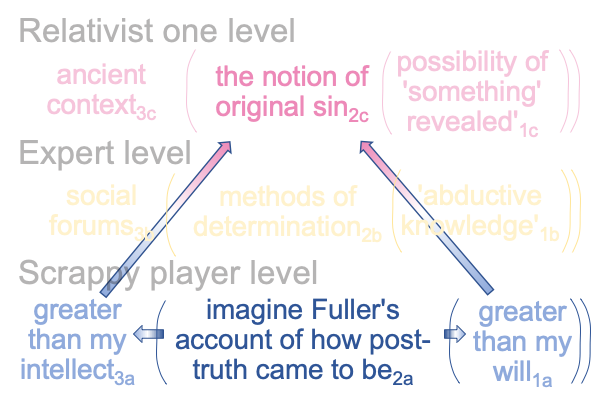
0506 Does Fuller merely relate a historical account of how the post-truth condition comes to be?
Or, is he also is making a discovery?
Or, should I say… revealing an insight?
0507 On January 2, 2024, in his blog, Razie Mah proposes that the doctrine of original sin needs to be reformulated in light of a fact. The science of genetics disproves Saint Augustine’s claim that Adam’s transgression passes from Adam to all humans through direct descent, without modification. Genetics establishes, beyond doubt, that there is no bottleneck in human evolution that would correspond to an original human pair, unless that pair exists hundreds of thousands of years ago.
Consider Looking at William Lane Craig’s Book (2021) “In Quest of the Historical Adam” and Looking at Andrew Ter Ern Loke’s Book (2022) “The Origin of Humanity and Evolution”, appearing in Razie Mah’s blog in September, 2022, and November, 2023, respectively. These examinations show the futility of regarding Adam and Eve as the originators of our species, Homo sapiens.
0508 Mah’s proposal launches a strange and serious enterprise.
At this moment in history, psychometric experts3b testify that their analysis2b of what people say2a shows no need for the doctrine of original sin, except for the problem that people do not understand how the system works2c. “Religion”, once attributed to “Christian factions”, no longer has relevance compared to bureaucratic rationalizations2b that narrow formal knowledge1b into two tranches, one capitalist and one socialist, which combine into a mystery, an intersection, that is far more salient to modern society than so-called “religion”. Value2b is a single actuality constituted by the actualities of financial transaction2H and organizational objective2V. Or, shall I say, money and politics?
0509 Some of the more intellectually inclined scrappy players go so far as to call America’s government-occupying secular bureaucracy a “religion”. And, it is. But, it is not “religion” defined as “a Christian faction”.
Yes, it depends on how one defines the word, “religion”.
0510 Sophistication aside, the one of scientism3c, who rules this “system”, may well be a manifestation of… yes… original sin. How does one account for scientism3c as a person writ large, possessing the minds of apparently regular people, as institutions writ small, turning them into advocates for the scientismist one3c?
0511 Augustine focuses on disordered desires. Does a doctrine of disordered desires suffice to account for the disoriented minds that justify the deranged valuations2b of psychometric experts3b? Or, are disordered desires and disoriented minds both symptoms of an evolution-twisting cultural trajectory that is portrayed in the Genesis stories of Adam and Eve, all the way to the Tower of Babel? An affirmative answer to the second question opens the door to a second doctrine of original sin.
0512 If the early chapters of Genesis are fairy tales concerning the instigation of unconstrained social complexity during the Ubaid and the Uruk archaeological periods of southern Mesopotamia, and if the Ubaid culture of southern Mesopotamia is the first culture to practice speech-alone talk, at a time when all other cultures practice hand-speech talk,then theologians should weave the hypothesis of the first singularity into the fabric of a second doctrine of original sin.
0513 A second doctrine?
Yes, a second doctrine must account for Augustine’s first doctrine as a special application, in the same way that quantum mechanics accounts for Newtonian physics as a special application.
Inquiry into the post-truth condition may open the portal to a second doctrine of original sin.
So, I begin.
The book before me is by Michelle Stiles, the full title is One Idea to Rule Them All: Reverse Engineering American Propaganda. The book is copyrighted in 2022 and published by the author.
0514 The cover photo depicts a wolf in sheep’s clothing.
Yes, experts3b are human, just like scrappy players3a.
So, they could be the wolves in sheep’s clothing.
It is the scientismist one3c that I am not sure about.

